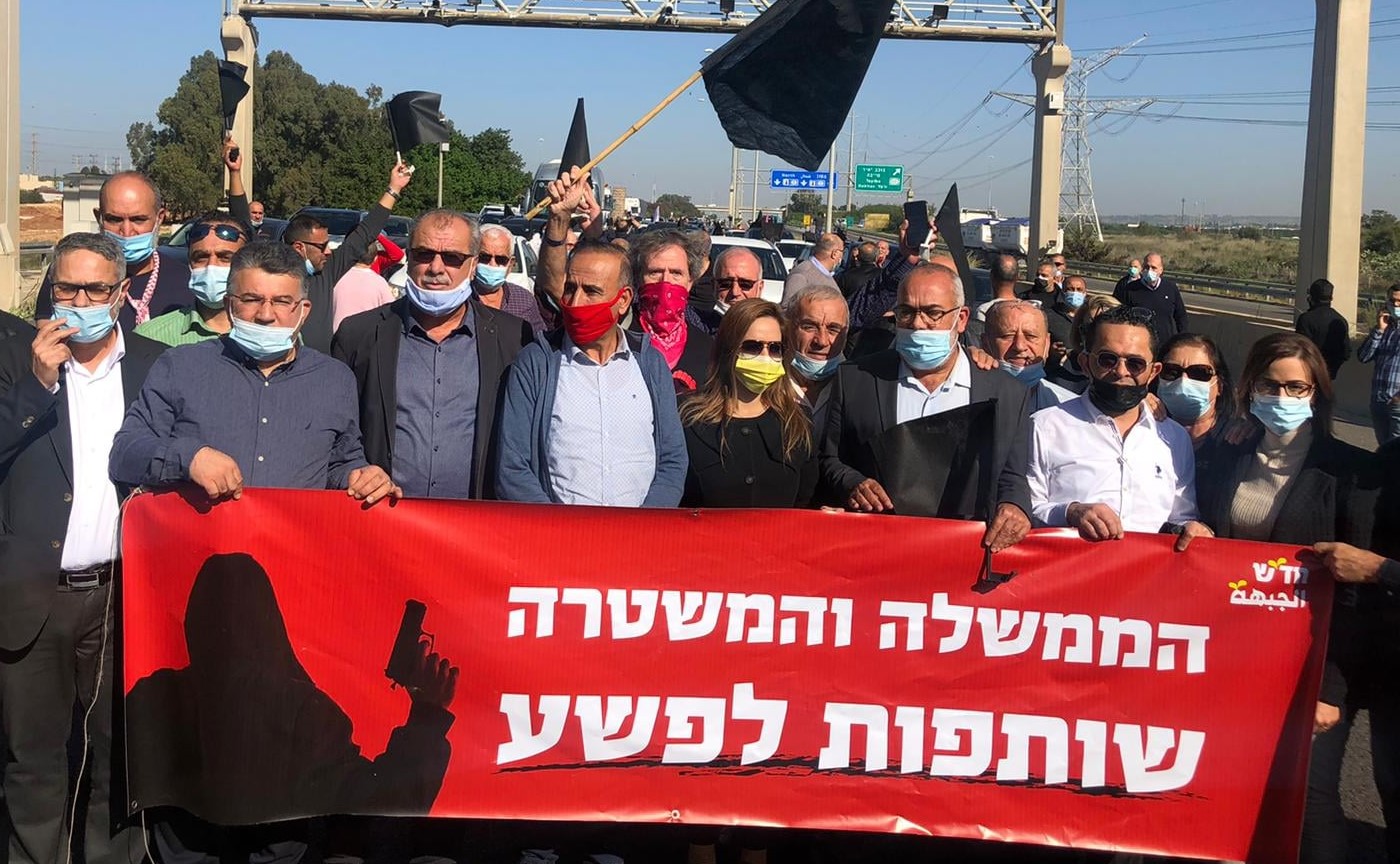Hundreds of cars set out in an organized convoy on Monday, December 21, from northern Israel to Jerusalem to protest the far-right government’s chronic inaction on gun violence and crime in the country’s Arab communities. The idea for Monday’s convoy was initiated following the triple gangland murder last Friday, December 18, of three Arab citizens of Israel from the same family, a crime that brought the number of fatalities among Arab citizens this year to 93, a 20-year high. Among the protesters in Monday’s convoy were numerous activists from the Communist Party of Israel (CPI) and Hadash, including lawmakers, local authorities and leading members of unions.

Leading members of the Joint List, including Hadash MK Youssef Jabareen (second from left) and the chair of the High Follow-Up Committee for Arab Citizens of Israel, Mohammed Barakeh (third from left), are among the hundreds who blocked traffic for about an hour on Route 6, Monday, December 21, to protest government and police inactivity in eliminating violent crime in Israel’s Arab communities. The Hasash poster reads in Hebrew: “The government and police are complicit in the crime.” (Photo: Zu Haderech)
The convoy blocked traffic for about an hour on Route 6, close to the entrance of the highway’s junction with the Arab towns of Baka al-Garbiyeh and Jatt in the Triangle region, before heading south towards Jerusalem. There the demonstrators gathered in front of the Knesset to “send the government and Knesset a message.”
The High Follow-Up Committee for Arab Citizens of Israel organized the protest and its head, leading CPI member and former Hadash MK Mohammed Barakeh, said that the protest convoy came to raise the voice of Arab citizens of Israel in the face of the spiraling escalation in crime and the complicity of the Israeli authorities with the violence. “The level of crime keeps rising and no one is spared its danger, as the number of shootings is increasing and not a day passes without such incidents in our towns and cities.”
Barakeh told those gathered outside the Knesset that activism in the social media, expressing anger and opinions on the matter of crime and violence in the Arab community, is very important at this stage, but cannot replace a popular struggle in the streets in various forms. The greater the public pressure, the sooner the Arab citizens of Israel will reach their goal of ending the cycle of the rabid crime in their communities.
Joint List Chairman MK Ayman Odeh (Hadash) tweeted on Monday, “We cannot fight organized crime with empty promises from Netanyahu — instead, we will engage in a civil struggle on every road throughout the country. We will force the government to put an end to the criminal neglect of Arab society,” Joint Odeh has also put forth a bill in the Knesset that would drastically increase the mandatory sentencing for the illegal possession of firearms. “We demand to be able to live in a society without weapons,” Odeh wrote. Joint List MK Youssef Jabareen (Hadash) agreed: “We cannot stand idly by as long as blood continues to be shed in our communities.”
Arab lawmakers alleged that the government, through the police inactivity, has allowed illegal weapons, protection rackets and organized crime to proliferate freely in Israel’s Arab communities. Monday’s protest convoy was an attempt by Arab lawmakers to repeat the success of last October’s demonstrations calling for government action to combat the spread of violence in the Arab sector. At that time, thousands of Palestinian Arab citizens of Israel repeatedly marched against violence and organized crime in the cities and towns in which they reside. The marches, strikes and demonstrations spurred a government decision to produce a plan to counter violence in Arab cities and towns within 90 days, a plan which has yet to be implemented.
Related: Triple Murder; 2020 Deadliest Year for Arabs in Israel in Two Decades


